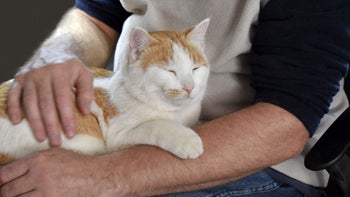
What Is It Like to Euthanize Your Cat? Here’s My Take — and My Advice
Key takeaways:
Euthanizing a pet can be a difficult and emotional decision.
If your cat has a low quality of life and health conditions that can’t be cured, it may be time to consider the process of painlessly ending their life.
Ask your veterinarian, “What would you do if this were your cat?” Let the vet’s answer guide your decision.

When my 18-year-old cat, Dharma, started hyperventilating with her mouth open and struggled to walk, I knew the prognosis must be very grim.
I didn’t want to dwell on this, because it might make it too hard to leave my house. But, as I drove her to the pet emergency room, I had a sinking feeling. I thought that my beloved best friend — a gray-and-white tuxedo cat — would not be coming back home with me.


The desk staff took Dharma right back to be examined, and I waited in an exam room for word from the vet. It was as bad as I’d feared: Dharma had suffered a stroke and blood clot.
“I guess this is the end?” I asked, as my eyes teared up.
The vet gently said, “Yes.” But I asked, as I always do, to make absolutely sure: “What would you do if this were your cat?”
Search and compare options
“I’d euthanize her,” the doctor said.
Crying, I signed the consent forms and waited for the doctor to bring my baby to me, wrapped in a blanket. I held her close, told her how much I loved her, and started playing the beautiful “Slumber my Darling” lullaby sung by Alison Krauss on my phone’s YouTube app.
But Dharma was in agony. She moaned in between panting episodes, and I just couldn’t let it go on even 1 minute more. I pressed the call button for the vet to come in and give her the lethal injection immediately. Dharma died in my arms seconds later.
Euthanasia, the ‘good death’

I wish I didn’t have as much experience with this painful loss as I do. But, since I got my first two kittens in 1996, I have had to euthanize six of my furbabies — two just recently.
Dharma died in August 2023, and Buf Puf, a buff-and-white tuxedo tabby, died in January 2024 from cancer. All my dearly departed kitties were very old or very sick, and there really was no other sensible, kind choice to make.
The word euthanasia comes from Greek words that mean “good death.” Deciding to end a beloved pet’s life hurts. But, it hurts the animal even more to go on declining with no improvement in sight.
Why isn’t my cat eating? Here are some common reasons.
How do you plan for end-of-life care for your pet? One option could be hospice for pets, which includes in-home visits from a veterinarian.
How much does it cost to euthanize a pet? The cost of euthanasia typically starts at $50.
How do you make a decision about cat euthanasia?
I’ve been through this painful process a half-dozen times. And I’m sure I’ll go through it several more times in my lifetime. While euthanizing your cat never gets easier, I would like to share some advice and insight with other cat parents who are facing this choice.
1. Know the signs that a cat is critically ill
We know how much our kitties live to eat. So for cats, loss of appetite is often a sign of a serious illness. In fact, for such a food-motivated animal, I would say lack of interest in food is the most poignant symptom that your cat is not feeling well.
If your cat stops eating, take them to the vet as soon as possible. Appetite stimulants and treatment of the underlying condition might fix the problem quickly. But if the appetite stimulant stops working, or doesn’t work in the first place, that is typically a reliable sign that it is probably time to euthanize. The same goes for difficulty breathing. If this can’t be fixed, a cat’s quality of life is gone. Of course, consult your veterinarian.

When Buf Puf got sick over Christmas, he bounced back on the medications the vet gave him, and he was in decent shape for more than a week. But then, when this little piggy — known for his big appetite — wasn’t even eating while on a stimulant, I knew the situation was hopeless.
My cat could have gone a few more days without food. But, he would have suffered and gotten hepatic lipidosis, a serious liver disorder. This condition killed my first cat, Buster, in 2007. So I chose to spare Buf Puf those final days of misery, as much as it hurt me.
2. Don’t prolong your decision
Of course, we all want as much time as possible with our loved ones, both the two-legged and four-legged kinds. I myself have waited until the very end to euthanize some cats, when their quality of life is terrible and there is no affordable or reasonable option for improving it.
That said, in one case, if I could do it over again, I may have chosen to euthanize earlier than I did, for my poor cat’s sake. My sweet Rum Tum — an orange tabby and white tuxedo who spent 17 years with me after I got him as a kitten in 1996 — had renal failure. For more than a year, I kept him going with a decent quality of life through the use of subcutaneous fluids, a special diet, and lots of TLC. Rum Tum made it longer than I thought he would, and I canceled one euthanasia appointment because he unexpectedly bounced back that morning. He lived 4 more months.
Read more like this
Explore these related articles, suggested for readers like you.
Then, when I did take him in to be put to sleep, I had no doubt it was time. The veterinarian agreed, saying that Rum Tum couldn’t go down any further.
The final nosedive was swift and severe. Still, I wonder if, perhaps, I could have spared him a few awful days before Rum Tum reached the point where he couldn’t go down any further. It’s hard to say.
My rule is to extend the cat’s life if its quality is decent and the kitty still seems to enjoy life, even in a diminished condition. Treatment has to be affordable and reasonable, too.
Few of us are able to spend thousands of dollars, or take on thousands of dollars in debt, to save a pet’s life. This makes less sense for a senior cat, too, if their natural lifespan — about 13 to 17 years — has been fulfilled, as much as we may love them.
3. Don’t beat yourself up with guilt
We pet parents often struggle with guilt for choosing to humanely end our beloved cats’ lives. Even when there is no other sensible or kind option, we still might feel some guilt over being the one to make that painful decision. Sometimes, the situation is a little more gray: The cat could go on another few days, weeks, or months. But should the cat go on and suffer?
I have found that the best way to preempt feeling guilty and second-guessing, and to feel a sense of peace in making this painful decision to euthanize, is to ask the veterinarian, “What would you do if this were your cat?”
This question puts vets in a position where they balance their clinical knowledge with the empathy of imagining their own beloved furbabies. Every time I have asked this question, I have received an affirming response that euthanasia was the right choice.
I remember one sad day when my young buff tabby Douglas, who was born with a congenital kidney defect, was very sick. Though he was only 5, the vet wasn’t sure he would survive even another year. While I was grateful that Douglas made it longer, it was still heartbreaking. As the doctor recommended euthanasia, she told me about how she herself had kidney disease when she was young. She felt absolutely horrible while enduring the disease, she said. If Douglas could speak, he would plead with me to end his suffering, she said. That did it for me.
4. Be there for your cat at the end
I’ve never wanted to leave my cat alone with the vet to be euthanized. I consider my cats my feline friends who comfort me during my times of sadness. At the end of their lives, I want to be there in the final moments and show my love.
My advice is to hold your cat, speak loving words of comfort, and play soft, soothing music if you feel like it. Besides “Slumber my Darling,” I am fond of playing the U2 lullaby-like song “MLK,” which goes: “Sleep, sleep tonight …”
5. Euthanasia is an emotional experience, so take care of yourself
Ask a friend or family member to drive you to and from the appointment. When it’s all over, cry as much as you need to. I like to wrap myself in a blanket, lie on the couch with a tissue, and listen to meditations about pet loss and soothing music as I grieve my loss.
Frequently asked questions
Cat euthanasia is a lethal injection that peacefully and painlessly stops your cat’s heart within seconds. It is often performed by a veterinarian to prevent further suffering in cases of terminal illness or severe injury.
Generally, if a cat’s quality of life is low and treatment options have been exhausted, euthanasia is the humane choice. Labored breathing, loss of appetite, and chronic pain are some key signs that it is time.
No. Almost always, your cat will lose consciousness and simply drift peacefully and painlessly away in seconds.
The bottom line
Euthanizing a beloved pet is a painful experience and a difficult decision to make. With veterinary advice, pet owners can feel confident they are making the right decision.
Why trust our experts?
































